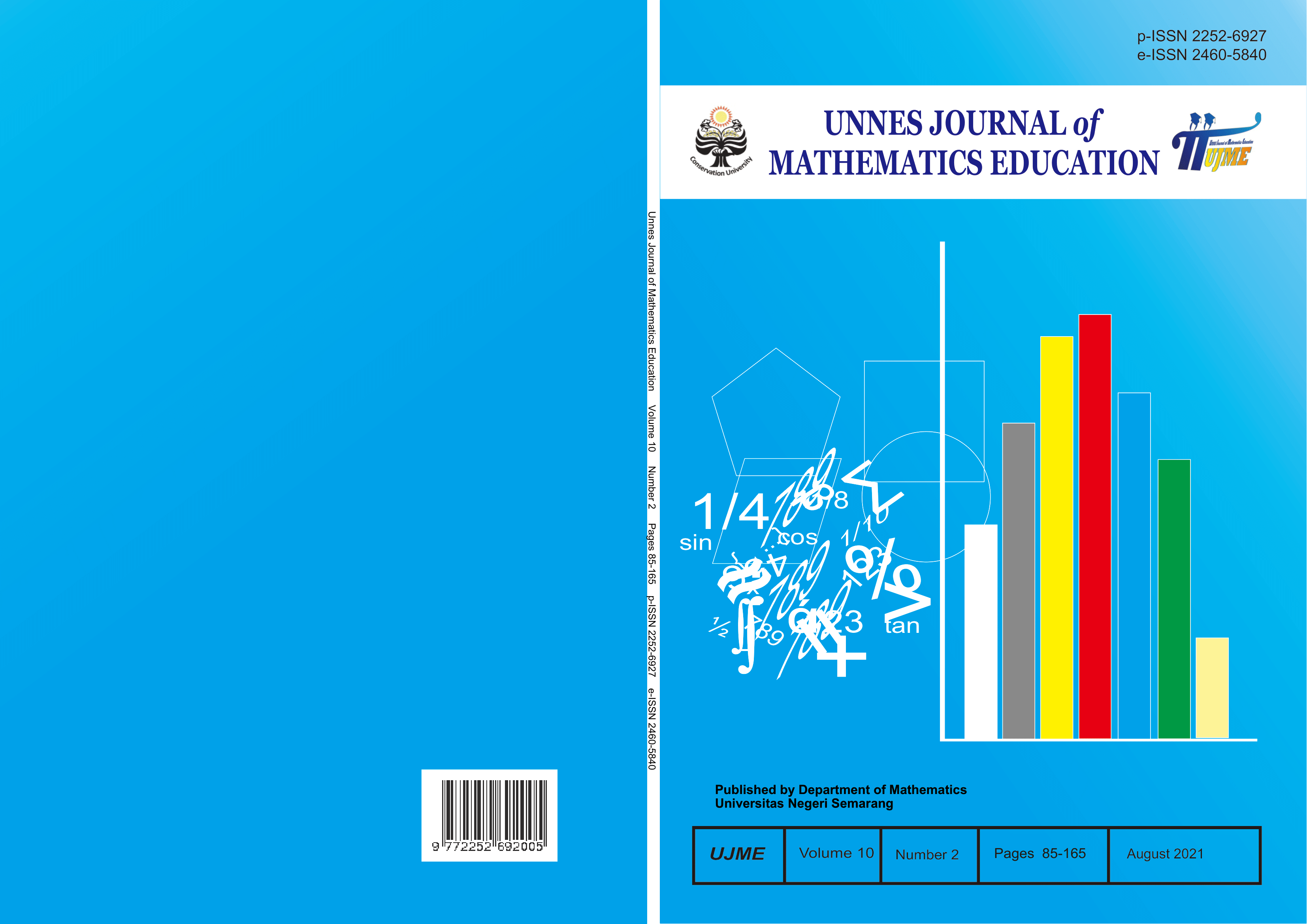Mathematical representation ability of class VII students on ARIAS learning model viewed from self-renewal capacity
##plugins.themes.academic_pro.article.main##
Abstract
This study aims to describe: 1) The effectiveness of the ARIAS learning for mathematical representation ability; 2) The ability of mathematical representation viewed from Self-Renewal Capacity (SRC). The method used is mixed methods with a population of class VII students of SMP N 40 Semarang 2019/2020 school year. Samples were taken by random class technique, obtained VII C as an experimental class and VII B as a control class. Subjects were taken using the purposive sampling technique, and 9 subjects were selected based on the student’s SRC category. The methods of data collection using tests, questionnaires and interviews. The results showed that (1) ARIAS learning was effective against MRA; (2) Subjects with high SRC tend to meet all indicators of MRA; subjects with moderate SRC, S-04 and S-05 tend to meet all indicators of MRA, S-06 were less able to write down the steps for solving mathematical problems in words; Subjects with low SRC, S-07 was less able to create mathematical equations or models from the representations given and write down the steps for solving mathematical problems in words, S-08 and S-09 were unable to create mathematical equations or models from the representations given and write down the steps for solving mathematical problems in words.
##plugins.themes.academic_pro.article.details##
References
Azwar, S. (2019). Penyusunan Skala Psikologi. Yogyakarta: Pustaka Pelajar.
Dewanty, P. (2017). Pengaruh Model Pembelajaran Assurance, Relevance, Interest, Assessment dan Satisfaction (ARIAS) terhadap Kemampuan Representasi dan Self-Concept Matematis Siswa SMA. Skripsi. Universitas Pasundan.
Dewi, N. R. (2017). Meningkatkan Kemampuan Berpikir Matematis Tingkat Tinggi dan Self-Efficacy Mahasiswa Melalui Brain Based Learning Berbantuan WEB. Disertasi. Bandung: Universitas Pendidikan Indonesia. .
Effendi, L. A. (2012). Pembelajaran Matematika dengan Metode Penemuan Terbimbing untuk Meningkatkan Kemampuan Representasi dan Pemecahan Masalah Matematis Siswa SMP. Jurnal Penelitian Pendidikan, 13(2).
Goldin, G.A. (1998). Representational Systems, Learning, and Problem Solving in Mathematics. The Journal of Mathematical Behavior, 17(2), 137-165.
Ifanda, A. R. & Septian, A. (2019). Peningkatan Kemampuan Representasi Matematis dan Self-Confidence Siswa Melalui Model ARIAS. UNION: Jurnal Pendidikan Matematika, 7(2), 285-297.
NCTM. (2000). Principles and Standards for School Mathmematics. USA.
OECD. (2019). PISA 2018 result in Focus. OECD Publishing.
Raharjo, A. A. (2013). Analisis Kemampuan Komunikasi Matematis Berdasarkan Gaya Belajar Pada Pembelajaran Model ARIAS Siswa SMK Kelas XI. Skripsi. Universitas Negeri Semarang.
Saaravirta, T. (2007). In Search of Self Renewal Capacity: Devining Concept and Its Theoritical Framework. SENTE Working Papers of University of Tampere (10), 1-11.
Sabirin, M. (2014). Representasi dalam Pembelajaran Matematika. JPM IAIN Antasari, 1(2), 33-44.
Ståhle, P. (1998). Supporting a System’s Capacity for Self-Renewal. University of Helsinki: Departement of Teacher Education..
Suryana, A. (2016). Meningkatkan Advanced Mathematical Thinking dan Self-Renewal Capacity Mahasiswa melalui Pembelajaran Model PACE. Tesis. Universitas Pendidikan Indonesia.
Susilawati. (2015). Peningkatan Kemampuan Representasi Matematis dan Self Esteem Siswa dengan Model Pembelajaran ARIAS pada Siswa Sekolah Menengah Pertama. Tesis. Universitas Terbuka.
